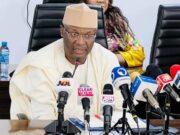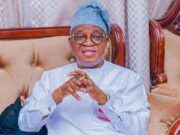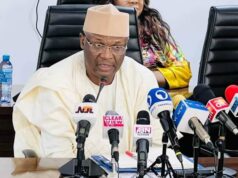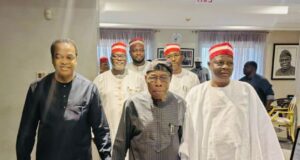In the past week, the opposition parties in Nigeria faced significant setbacks as five members of the House of Representatives, including four from the Labour Party (LP) and one from the Peoples Democratic Party (PDP), defected to the ruling All Progressives Congress (APC).
This was followed by two more members from Plateau State also joining the APC, intensifying concerns about the weakening opposition in the country.
These defections, which the LP has contested, have compounded the challenges faced by the opposition, further diminishing their representation in parliament and limiting their ability to voice dissent.
Prior to these events, the opposition had already suffered several high-profile defections, including that of former Secretary to the Government of the Federation, Anyim Pius Anyim, and former PDP gubernatorial candidate in Ebonyi State, Obinna Ogba.
Additionally, Labour Party member, Edward Nkwegu and Imo-East Senator Francis Ezenwa had also joined the ruling APC.
The opposition has also seen the departure of former Deputy Speaker of the House of Representatives, Emeka Ihedioha, and former spokesperson for a PDP presidential candidate, Daniel Bwala.
This influx of defections has dealt a severe blow to the leading opposition parties—PDP, LP, and the New Nigeria Peoples Party (NNPP)—which are already grappling with internal crises.
Political analysts suggest that the opposition in Nigeria is experiencing one of its weakest periods, marked by a lack of unity and diminished presence in national discourse.
Despite widespread dissatisfaction with the current administration, critics argue that the opposition has failed to effectively challenge the government.
The absence of a strong, organized opposition is particularly notable in the legislature, where the ruling party is increasingly playing the role of holding the government accountable, a function traditionally reserved for opposition lawmakers in a democracy.
Following the inauguration of the current administration, the APC held 63 Senate seats, while the PDP had 34, LP had 5, and the NNPP had 2.
In the House of Representatives, opposition parties secured 181 seats, with the PDP winning 117, LP 35, NNPP 19, and other smaller parties claiming the remaining seats.
Despite their numbers, the opposition’s influence in both chambers of the National Assembly has been limited.
The challenges facing opposition parties are not only political but also financial, with most of these parties struggling to maintain strong internal structures.
Critics argue that many Nigerian political parties, especially opposition ones, operate more as vehicles for securing power rather than as platforms with clear ideologies and visions for governance.
This lack of a coherent ideological foundation has made it difficult for them to offer viable alternatives to the ruling party, and when they do gain power, they are often driven by patronage rather than a commitment to democratic principles.
Civil society organizations (CSOs) have pointed out that the weakness of opposition parties in Nigeria is a result of several factors.
Mark Amaza, Senior Communications Officer at Yiaga Africa, attributed this weakness to the way political parties are structured, often focusing on access to power and patronage rather than policy-driven agendas.
Comrade Ibrahim Zikirullahi, Executive Director of the Resource Centre for Human Rights and Civic Education (CHRICED), noted that many politicians see themselves as relevant only when they are in power, which weakens the opposition’s resolve and contributes to its dysfunction.
Dr. Mufuliat Fijabi, Executive Director of the Sustainable Gender Action Initiative (SGAI), emphasized that self-interest within both politicians and parties is stifling the development of strong opposition movements.
Without a genuine commitment to good governance and nation-building, opposition parties remain ineffective in holding the ruling government accountable.
At the party level, the PDP has struggled to recover from the shock of its 2015 loss and the subsequent internal divisions following the 2023 elections.
The Labour Party, too, has been plagued by leadership disputes and factionalism, while the NNPP faces similar challenges regarding its leadership.
The Social Democratic Party (SDP), though less divided, still lacks the organizational strength to challenge the APC effectively.
Historically, Nigeria’s opposition was much stronger, especially during the Second Republic, when parties like the UPN, GNPP, PRP, and NPP formed coalitions to challenge the dominance of the ruling NPN.
The APC, during its formation, also posed a strong challenge to the PDP, organizing protests and pushing for change until it eventually unseated the PDP from power.
Despite the ongoing crises, the leadership of the PDP, LP, and other opposition parties insists they are fulfilling their roles.
Timothy Osadolor, a member of the PDP’s National Executive Committee, blamed the APC’s dominance and the government’s use of poverty as a political tool for the weakening of the opposition.
Labour Party spokesperson, Obiora Ifoh, argued that the LP has been active in offering constructive criticism, particularly on issues like the subsidy removal.
Similarly, SDP National Chairman Alhaji Shehu Gabam defended his party’s opposition role, emphasizing its vocal stance on government policies.
In contrast, the APC has denied any involvement in destabilizing opposition parties.
Alhaji Bala Ibrahim, APC National Director of Media and Publicity, dismissed allegations that the ruling party is behind the crises in opposition parties, claiming that the opposition simply lacks the understanding of how to effectively challenge the ruling government.
The former presidential candidates from the opposition parties, Atiku Abubakar, Peter Obi, and Rabiu Musa Kwankwaso, have attempted to sustain the opposition’s fight, voicing their concerns over government policies.
However, their inability to unite their factions has often diluted their effectiveness.
Political analysts fear that, given the current state of affairs, Nigeria could soon experience the reality of a one-party state.

















